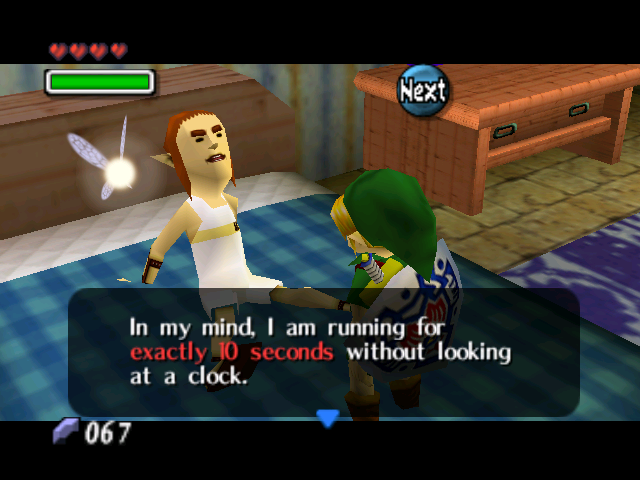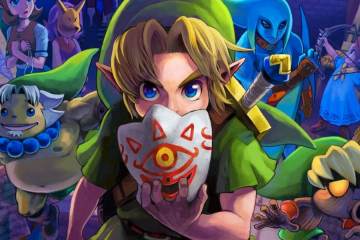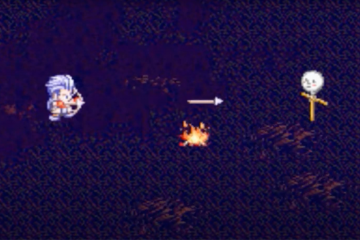The following is an entry in “A Comprehensive Theory of Majora’s Mask,” a series that analyzed the storytelling of Majora’s Mask from the time its 3D remake was announced to the time the remake was released. Find the full series here.
“In my mind, I am running for exactly
ten seconds without looking at a clock.”
-The Postman, “Legend of Zelda: Majora’s Mask”
So far, my analysis of characters in “Legend of Zelda: Majora’s Mask” has primarily been contained to major characters figuring in the game’s main plot — the Happy Mask Salesman, Skull Kid, etc. But some of the most salient characters in the universe of Termina need not ever be encountered in order to complete the main plot of the game, and it is to one of these characters that I turn in this article: the meticulous Postman of Clock Town.
What exactly is the Postman? At first glance, he might seem as much a piece of scenery as a NPC: in later entries in the series (e.g., “Twilight Princess”) he interacts with Link by giving him mail, but the only mail he delivers in “Majora” is to other NPC’s, making him seem more like mechanic of Clock Town than an individuated character. Yet just as different levels of ethical discourse emerge based on how much of the game the player engages, so too does the player have the opportunity to discover much more about the Postman by seeking him out and engaging with him. As the pace of life in Clock Town accelerates over the course of three days (something which I described when analyzing the music of “Majora”), the pace of the Postman’s daily route accelerates as well, effectively keeping time with the town. Each night, in his home which is identical to the Post Office, he practices “mental training” in which he visualizes running for precisely ten seconds, in order to perfectly adhere to his schedule.

Yet at the same time that the Postman epitomizes public service in unflinching adherence to ‘the schedule’, another part of the Postman runs counterpoint to this: his desire to escape Clock Town. In the same breath that he preaches his devotion to the schedule, he bemoans that he cannot satisfy his desire to flee because fleeing “[is] not written on the schedule.” In this way, the Postman’s internal struggle is eerily reminiscent of the cosmic friction of Termina, which I previously described as the struggle between Armageddon and renewal. I quote from my article on the musical metaphysics of Termina: “Termina is a world defined by time, and time in ‘Majora’ is metricized through music. We can even frame the basic tension of the game through music: the story of ‘Majora’ is the push-and-pull of the Song of Time against the Clock Town Theme. The accelerating, manic juggernaut of the Clock Town Theme is the underlying tendency of the game’s universe toward extinction, and the Song of Time is manifest will, the agency of humanity staring into inevitable demise and asserting themselves in the face of extinction. On a Nietzschean reading, every other component of the game is derivative of the counterpoint between these two musical themes.” At the time, I did not pursue the claim that other components of the game are derivative of the musical counterpoint, but the Postman presents an example of exactly that: his turmoil is a microcosm of the universal tension between inevitable demise and the desire for salvation.


At first glance, the struggle of the Postman looks like the Sisyphean primitive (i.e., being doomed, for all time, to push a boulder up a hill only to have it roll back down to the bottom): he is the man who is doomed to struggle for all time with an endlessly repeating task, with the only hope of ‘success’ manifesting in some form of existential transcendence (think Camus’ The Myth of Sisyphus). In the remainder of this piece, however, I will argue that the position of the Postman, from the player’s perspective, is too complicated to reduce to the primitive of Sisyphus. It is that complexity which renders the Postman particularly salient as a case study within the world of Termina.
There are two levels on which we may assess the Postman. First, we may ask the question of how he evolves as a character through the narrative of Termina, independent of the role played by the player as a narratologically significant agent; I will refer to this level of analysis as ‘flat analysis’, because it treats the game narrative as a planar construct independent of player involvement. The second level of analysis, in contrast, takes player agency as an essential component of the narrative’s discourse, which coheres with my model of Termina as nontrivially dependent on player agency; in contrast to flat analysis, I refer to this as ‘full analysis’. Readers who have been following the course of my argumentation may observe that this is a false dichotomy, for, if the narrative of a video game is dependent on player agency, then it doesn’t make a lot of sense to examine its storyline independently of player agency. What I hope to suggest in this article is that the process of first undertaking flat analysis, incomplete though it may be, can put the analyst in a better position for a full analysis thereafter.

There are two horns to the flat analysis of the Postman: how he expresses his desire to escape on the one hand, and how he ultimately achieves “liberation” on the other hand. To try to convince himself to flee the doomed Clock Town, the Postman writes and mails a letter to himself. The letter reads:
“To Myself,
You have been doing a great job delivering the mail.
I have a request for my hard-working self. All of the townsfolk have taken refuge. I want myself to flee, too. Even if it is not written on the schedule, I want myself to flee. Please…
From Me“
What’s noteworthy here (no pun intended) is that the only apparent recourse available to the Postman in order to question his absolute adherence to schedule is an operation within the bounds of that schedule: he must mail and deliver a letter to himself in order to question his uncompromising commitment to the delivery of mail. This commentary is in 20th century literary theory: our critiques of systems are limited to the language of discourse allowed by the system.
We get a fuller image of the Postman’s situation by considering the other horn of the flat analysis: he is only able to attain “freedom” via a directive from his superior (Postmistress Madame Aroma) to abandon his schedule and flee (1:30 in the video). After Aroma orders the Postman to flee Clock Town, the Postman remarks to Link: “I have decided to flee. It is an order from the Postmaster. I am now free! I can set my own schedule”; he then bequeaths his Postman’s Hat to Link, since he doesn’t need it anymore. Yet there is an apparent contradiction in the Postman ‘deciding’ to flee based on an order from his superior — an order, to be blunt, from his master. The problem, because of which I have been putting “freedom” in scare quotes, is this: putting aside for a moment how we strictly define ‘freedom’, it seems as though being told to go elsewhere by the architect of one’s daily life (i.e., the Postmistress) cannot instantiate substantive freedom.
The dilemma of what ‘freedom’ means in the case of the Postman is fleshed out by the first horn of the flat analysis: because the Postman’s life is determined by his schedule — and, more generally, by his role as the Postman, for we know him by no other name — he can only gain a sense of agency by the will of the determining system. Because the Postmistress maintains the system, she is in a position to “liberate” the Postman from his schedule by ordering him to no longer follow it. But this, of course, does not reveal the Postman to suddenly have free will; rather, it underscores the hard determinism of his existence by revealing him to be entirely subservient to his boss. When he exclaims that he is ‘free to set his own schedule’, his words can be glossed as an exclamation of happiness that he is ‘under orders to operate outside of his previously-conceived schedule’. When he dances out of Clock Town after leaving his Postman’s Hat, he does not do it as a result of having quit his work, or even from asking permission to leave the Town; he does it as the result of a direct order.
It’s not particularly interesting to derive hard determinism from a flat analysis, and the reason should be obvious: if we artificially remove player agency from the narratological equation, then any remaining source of agency within the narrative seems disingenuous in comparison. Because the ontological course of NPCs is charted purely by programs, it’s a trivial matter to say that their existences are determined — in point of fact, such a framework is really only useful for exceptions such as Mikau, whose existential state is indeterminate prior to player engagement. So what’s much more interesting in the flat analysis of the Postman is his self-concept and matrix of sentiments in relation to his determined existence: though his life is charted by schedule and work, his mental life is not one of polite acquiescence, but rather reflects a friction in a desire to survive — and, if we consider his joy at eventually being “free” to set his own schedule, a desire to transcend. So the nontrivial understanding we can derive from flat analysis here is the picture of a man who is at once entirely subservient to the social structure, yet who, through internal dissonance, reflects a conceptual knowledge of and thirst for existence outside of that same social structure.

So much for flat analysis; what happens, then, when we return player agency to the mix and engage in full analysis? Here I also propose two horns to our approach: first, the role of the player in Termina’s metaphysical perpetuity; and second, the consequences of Link’s acquisition of the Postman’s Hat. Lastly, I will comment on what agency in general adds to the case of the Postman, and what we might hope to gain from him as a character in the universe.
As a way into the first horn here, recall that I have actually already mentioned Sisyphean themes once before in this blog, during my general discussion of the theory behind the sidequests of “Majora.” I quote the relevant section: “The final result of the game’s counterfactual analysis is that not everyone can be saved; and indeed, insofar as Termina continues to exist as an apocalyptic world even after Majora is defeated, any instance of even one person being saved is entirely fleeting. Yet though the game may tell you at every turn that your actions are meaningless, it demands to be played. Like the structure of Hades’ punishment for Sisyphus, every new decaying causal chain Link learns about through sidequests and main quests cries out for him to save humanity, if only for one single moment. It is this picture of Link saving no one but making everyone happy that emanates from the universe of the sidequests of ‘Majora.’” We are now in a position to better articulate what I left implicit in that early account of Termina: the Sisyphean nature of Termina is derivative of the player’s agency in playing the Song of Time. We know this because the universe of Termina depends upon the player’s perception of it to exist [see my analysis of ‘meeting with a terrible fate‘], and because the Song of Time is the metaphysical mechanism that instantiates new timelines and keeps Termina in a state of constant decay, as opposed to allowing it to end [see my space-time analysis in my discussion of the absence of Zelda in “Majora’s Mask”]. While it is a useful mechanism for existential discourse to talk about human life metaphorically as “Sisyphean” (again, see The Myth of Sisyphus), the fact of the matter is that human lives end. Without metaphysical intervention, the day-to-day “boulder pushing” of the Postman’s schedule would ultimately Terminate when the world was destroyed. Yet because Link perpetuates the universe by constantly playing the Song of Time to continue engaging it, this framework is warped into one that is truly ‘endless’ in the Sisyphean sense. The Postman may dance out of Clock Town after giving Link the Postman’s Hat, but Link need only play the Song of Time to stifle that timeline and see the Postman back at his delivery route on the Dawn of the First Day. So what we see player agency doing here is transmuting the Sisyphean aspects of the Postman’s life, moving them from the physical to metaphysical domain.
Admittedly, that sounds pretty terrible: if Link’s actions are turning the Postman into an actual Sisyphus analogue, it’s hard for the gamer to feel good about their actions, metaethical nihilism notwithstanding. Thankfully, the second horn of the full analysis — the consequences of Link acquiring the Postman’s Hat — offers us a more positive conception of this of affairs. Recall from my discourse on the absence of Zelda the concept of ‘temporal afterimages’: “mental remnants or representations of alternate timelines that necessarily precede the timeline in which one actually exists.” When I first coined the term, I was concerned with what exactly a temporal afterimage is, as opposed to what narratological impact they might have. Now, however, we are ready to move into the realm of narratology. As I noted in my discussion of Zelda’s absence, a prime example of temporal afterimages is the collection of masks that follows Link through the proceeding timelines of Termina. The Postman’s Hat, as a mask, is a temporal afterimage. It is also an emblem of public service, tantamount in the Postman’s case to an article of faith. Mechanically, it vests Link with the authority to act as a Postman, checking mailboxes throughout Clock Town, and even withdrawing items from the mailbox (i.e., a Piece of Heart).
That Link is able through the Postman’s article of temporal afterimagery to assume the role of a Postman is crucial because it allows the Postman to achieve the transcendence that we would imagine him denied as an NPC. The way this works is as follows: as the flat analysis showed, the Postman is incapable of expressing agency outside the bounds of the system of his determined role as the Postman. However, as I have previously described, Link, as the conduit from the player to the universe of the game, is the sole entity capable of expressing meaningful agency within the game’s universe. When Link dons the Postman’s Hat, he is able to enter into the system defined by the role of ‘Postman’, but is also able to express agency. He can therefore break the expected routine, by checking mailboxes at inappropriate times, taking the Piece of Heart, etc. What this means is that, by virtue of his connection with the player as an external source of agency, Link is able to subvert the expected routine of the Postman, symbolically defeating the same schedule that binds the Postman.

Now we have at least one viable account of why the distinction of flat/full analysis is useful: analyses proceeding in this form offer us a more precise account of how player agency influences and molds narratology, making it a helpful model for the interpretation of video games as aesthetic objects. Without the player, the Postman is a man consciously trapped in the construct of a role and schedule throughout his life; when Link and the player arrive, the Postman’s suffering is immortalized, but he also transcends this suffering by inviting the game’s one true agent into the framework of his own role. Though the Postman can never truly be free, we might say that the interposition of Link allows him to truly flee.
Continue Reading
- A Comprehensive Theory of Majora’s Mask series navigation: < “Console Analysis: What a portable Termina means for Majora’s Mask” | “Aliens, cows, and Assassin’s Creed: what works, and what doesn’t” >



